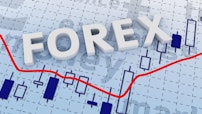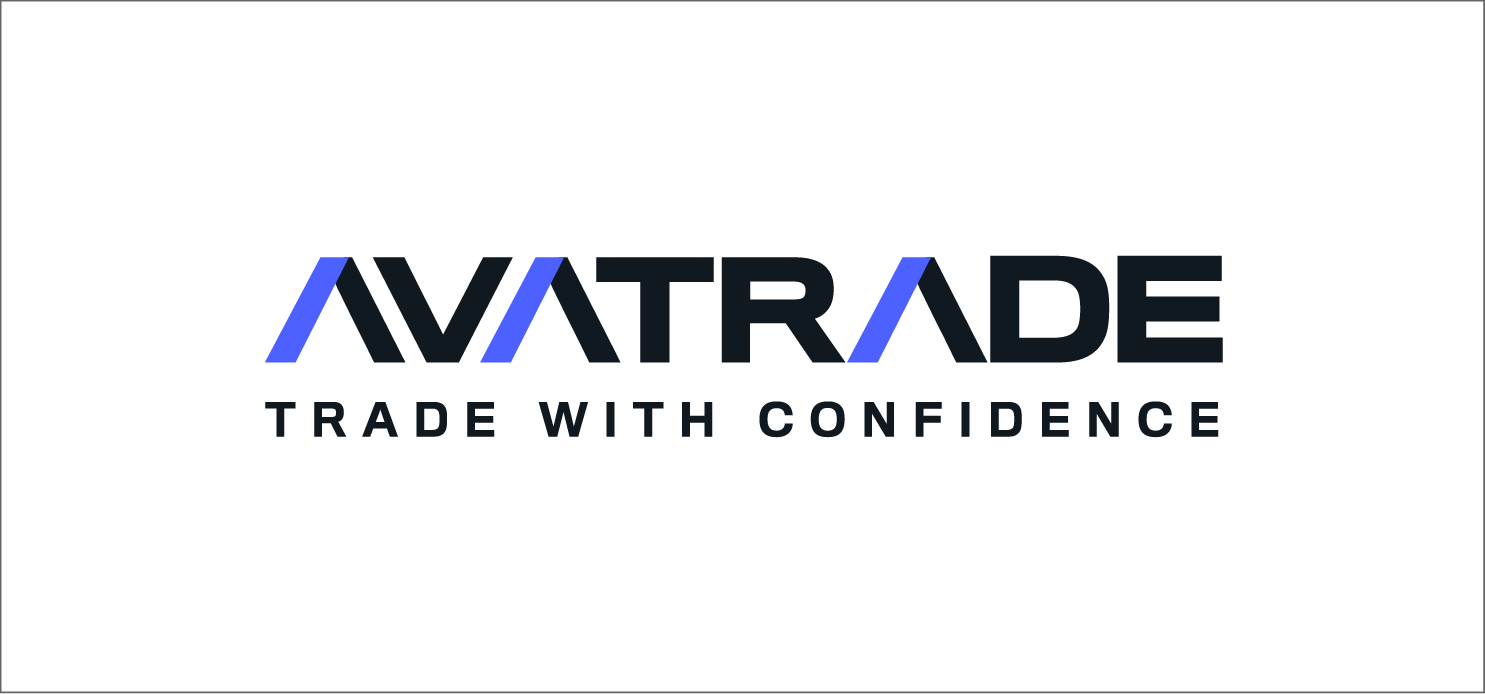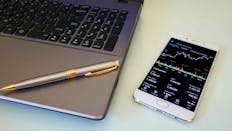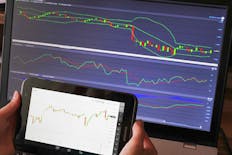The Best 7 Forex and CFD Brokers in Australia in 2026
All products and services featured are independently selected by WikiJob. When you register or purchase through links on this page, we may earn a commission.
- A list of the Top Forex and CFD Brokers in Australia for January 2026:
- Comparison Chart of the Best Forex and CFD Brokers in Australia for January 2026
- Description of the Best Forex and CFD Brokers in Australia for January 2026
- Why Use a Forex Broker?
- What to Look for in the Best Forex Broker
empty
empty
empty
empty
empty
empty
- Frequently Asked Questions
- Final Thoughts
A forex broker is the party responsible for buying and selling currency on a trader’s behalf. They offer clients access to this global market 24-hours a day, five days a week.
The popularity of forex among retail traders has encouraged many brokers to operate in this market; however, some are more reputable than others.
Therefore, operating standards and regulation are key factors to be considered when choosing the best forex broker.
In Australia, regulation is governed by the Australian Securities and Investments Commission (ASIC).
Though its rules are less stringent than those enforced under other jurisdictions, such as that of the UK, ASIC regulation still provides good protection for retail traders and their funds.
This article will discuss what to look for in a good forex broker before offering an overview of 7 of the best brokers operating in Australia.
A list of the Top Forex and CFD Brokers in Australia for January 2026:
Below is our list of the best forex brokers and CFD traders in Australia. It should be noted that these recommendations are based on research and reputation and do not relate to any personal experience.
All brokers on this list are regulated by ASIC.
Comparison Chart of the Best Forex and CFD Brokers in Australia for January 2026
Minimum Deposit $100 | Platform MetaTrader 4, AvaTradeGO | Educational Resources Yes | |||
Minimum Deposit $0 | Platform MetaTrader 4 (MT4), MetaTrader 5 (MT5), cTrader, TradingView | Educational Resources Yes | |||
Minimum Deposit $0 | Platform IG Platform | Educational Resources Yes | |||
Minimum Deposit $100 | Platform Plus500 Platform (CFDs only) | Educational Resources Limited | |||
Broker Switch Markets | Minimum Deposit $200 | Platform Proprietary | Educational Resources Limited | ||
Broker Saxo | Minimum Deposit None | Platform SaxoTraderGO, SaxoTraderPRO | Educational Resources Yes | ||
Broker Capital | Minimum Deposit $20 | Platform Proprietary | Educational Resources Yes |
Note: The information in this table is subject to change and may not be complete. It is important to research and compare brokers thoroughly before opening an account.
Description of the Best Forex and CFD Brokers in Australia for January 2026
1. AvaTrade
Pros
- Worldwide regulated
- Multiple platforms – MT4, MT5, etc.
- 20% welcome bonus
- Educational content
- Wide rage of payments methods
- Fixed spreads
Cons
- You can’t buy stocks
- Quarterly and annual inactivity fees
- Custumer support is not available 24/7
- No bonus for EU based clients
- No US clients accepted
- Imitated crypto assets
AvaTrade is a CFD Regulated broker with +1,000 financial instruments and multiple trading platforms. It has been operating since 2006.
It offers a 20% welcome bonus up to $10,000, according to regulation and a free 21-day demo account with $100,000.
Instruments include:
- Metals
- Commodities
- Stocks
- FX Options
- Oil
- ETFs
- Options
- Crypto currencies
- CFDs
- Indexes
- Shares
- Spread betting
- Indices
- Forex
- Bonds
AVATrade is regulated by the Australian Securities and Investments Commission (ASIC), which enhances its credibility and assures traders of a certain level of transparency and accountability.
Avatrade offers a user-friendly trading platform that caters to both beginners and experienced traders. The platform provides various tools and features for effective trading, making it appealing to a wide range of traders.
Avatrade provides access to a diverse range of financial instruments beyond forex, including commodities, cryptocurrencies, stocks and indices. This variety allows Australian traders to diversify their portfolios.
Mínimum deposit of $100, no withdraw limit and no fees.
2. Pepperstone
Pros
- Extensively regulated
- No minimum deposit
- Low fees and mostly free withdrawals
- Good customer service
Cons
- No investor protection for clients outside UK, EU and EEA
- Withdrawal fee for international bank wires
- CFDs only
Pepperstone is widely recognized as one of the top forex and CFD brokers in Australia, offering a range of features that cater to both novice and experienced traders.
Pepperstone is regulated by several top-tier financial authorities, ensuring a high level of security and transparency. In Australia, it is regulated by the Australian Securities and Investments Commission (ASIC), which is known for its stringent regulatory standards. This ensures that Pepperstone adheres to strict financial practices and provides a secure trading environment for its clients.
Pepperstone offers some of the most competitive spreads in the industry, starting from as low as 0.0 pips on major currency pairs like EUR/USD through its Razor account. The broker also charges low commissions, making it cost-effective for active traders and scalpers.
In Australia, Pepperstone provides leverage up to 1:500 for professional traders, which allows for greater market exposure with a smaller initial investment. This high leverage can significantly enhance trading potential but also comes with increased risk, requiring careful risk management.
Pepperstone provides a wealth of educational materials, including webinars, tutorials, market analysis, and trading guides. These resources are designed to help traders at all levels improve their skills and stay informed about market developments.
Pepperstone offers 24/5 customer support via live chat, phone, and email, ensuring that traders can get timely assistance whenever they need it. The responsive and knowledgeable support team is an essential resource for resolving any issues that may arise during trading.
3. IG Forex
Pros
- Highly regulated
- MetaTrader 4 (MT4)
- Over 10,000 instruments
- Available in the UK
- 24/7 customer support
Cons
- High fees
- No copy trading
- Inactivity fees
Founded in 1974, IG is a well-established forex broker with a strong reputation for security.
IG has a substantial history in the financial markets, which has contributed to its strong reputation among Australian traders. The broker's long-standing presence provides a sense of reliability and trustworthiness.
IG is regulated by the Australian Securities and Investments Commission (ASIC), ensuring that it operates within the regulatory framework set by the Australian government. This regulatory oversight gives traders confidence in the broker's legitimacy and adherence to industry standards.
It offers clients access to over 90 major, minor, exotic and emerging currency pairs.
IG works on a commission-free basis, with average spreads on major pairs between 1.0 and 2.0 pips, though these can go as low as 0.6 pips depending on market conditions.
Leverage is fairly low when compared to other brokers on this list, at just 1:30.
There are many platforms available to choose from, including MetaTrader 4 and ProRealTime, as well as IG’s proprietary platform and progressive web app.
IG’s strength is its comprehensive range of educational resources, including webinars, seminars and articles.
There are also several free online courses available through the IG Academy covering topics from beginner to advanced level.
To open an account, you will need a minimum deposit of $300. A free demo account is available should you wish to trial IG without risk.
IG's long-standing reputation, regulatory compliance, advanced trading platforms, comprehensive market access, educational resources and dedication to providing quality customer support have contributed to its popularity as a forex broker among Australian traders.
4. Plus500
Pros
- No buy/sell commissions and tight spreads
- Leverage of up to 1:30
- FREE unlimited Demo
- 2,800+ trading instruments
- Real-time quotes and advanced analytical tools
- Fast and reliable order execution
Cons
- No API integrations
- No social copy trading
Plus500 instruments are available for trading exclusively via CFDs and the service offered on the platform is CFD-based.
Plus500's straightforward and user-friendly trading platform appeals to Australian traders seeking an intuitive interface. The platform's simplicity allows both beginners and experienced traders to navigate and execute trades with ease.
Plus500 is regulated by the Australian Securities and Investments Commission (ASIC), ensuring that it adheres to stringent regulatory standards in Australia. This regulatory oversight instills confidence in Australian traders regarding the broker's legitimacy and security measures.
Australian traders using Plus500 have access to a diverse array of tradable instruments in the form of CFDs, including forex pairs, commodities, indices, cryptocurrencies, and more. This diverse offering enables traders to explore various markets and diversify their trading strategies.
The platform offers real-time price alerts, enabling Australian traders to stay informed about market movements and respond promptly to trading opportunities.
Plus500 offers customer support tailored to Australian traders. This localized support ensures that traders can receive assistance and resolve queries during local business hours.
Plus500's mobile trading app is popular among Australian traders who want to trade on the go. The app allows traders to monitor positions and execute trades from their mobile devices.
Its spreads are not as competitive as other brokers on this list; however, Plus500 does have transparent pricing, including zero fees for deposits.
Plus500 also lacks somewhat in its educational services, so if you are new to forex trading, you might want to gain prior experience before opting to use this broker.
5. Saxo
Pros
- Heavily regulated
- Good product portfolio
- Low forex fees
- No withdrawal fee
Cons
- Does not accept US clients
- High fees for options, futures and bonds
Another option for experienced traders on our best forex broker list is Saxo.
Saxo is regulated by the Australian Securities and Investments Commission (ASIC).
Saxo's advanced trading technology and platforms offer Australian traders a seamless and feature-rich trading experience. The SaxoTraderGO platform, for example, provides intuitive navigation and a wide range of tools.
Saxo provides innovative trading solutions such as options trading and social trading integration, catering to both traditional and modern trading preferences of Australian traders.
Saxo offers various account types and trading tiers, accommodating the needs of both novice and experienced Australian traders with different trading volumes and preferences.
There are three account options with this broker; Classic, Platinum and VIP. Entry requirements are high, with minimum deposits at A$3,000, A$300,000 and A$1,500,000 respectively.
However, Saxo does give traders access to 182 currency pairs, with competitive spreads as low as 0.4 pips and zero commission.
A leverage of up to 1:100 is also available.
Its award-winning proprietary platform, SaxoTraderPro, comes with a valuable set of advanced features, and SaxoTraderGo offers excellent functionality for mobile trading.
Saxo is not for beginner traders but is a good option for those with the funds and experience to make use of the market access and competitive pricing this broker provides.
6. Switch Markets
Pros
- Regulated by ASIC
- Low minimum deposits
- No deposit fee
- No inactivity fee
- Free VPS
- Social trading
- Tight spreads
- Useful trading tools and research
Cons
- Not FCA regulated
Founded in 2019, SwitchMarkets.com styles itself as 'the place traders come to trade', and with an enormous range of trading instruments available through MetaTrader 4 and a proprietary platform, SwitchMarkets.com has a lot to offer.
The parent company of SwitchMarkets.com (Royal ETP) is regulated by ASIC and CySEC as well as some other lower-tier jurisdictions, while client funds are segregated in Tier 1 banks – which makes it more secure.
Switch Markets has a strong focus on understanding the Australian forex market. This local expertise allows them to cater to the specific needs and preferences of Australian traders.
With SwitchMarkets.com you can trade:
- 62 Forex pairs
- 8 metals
- 21 indices
- 86 share CFDs
- 4 cryptocurrencies
There are just two account types available, which makes getting started a breeze – you can decide to go for a Standard account that offers zero commission and spreads as low as 0.6 pips, or a Pro account which has spreads from 0.0 pips and a $7 per lot round turn commission instead. Each account has a minimum deposit of just $50.
For international traders, and those that want flexibility in both deposits and withdrawals, there are multiple options – from the usual credit and debit card to PayPal and eWallets like Neteller and Skrill, for example.
Deposits and withdrawals are simple, fast and free.
The education available on the platform is also simple – several ‘cheat sheets’ covering all you need to know about trading, from terms to strategy, all in downloadable PDF formats and all for free.
There are several tools available on the platform to improve your trading strategy, including a Market Heat Map, lot size and Forex profit calculators, and even EA tools.
As a relatively new broker, traders will find many offers to entice them to sign up – from a free VPS to a credit bonus.
Switch Markets does not provide trading services to anyone residing in the USA, Yemen, Iran and North Korea nor any other countries where the offer of our products are prohibited or restricted by laws.

Why Use a Forex Broker?
One of the main benefits of forex trading is that it is accessible to traders of all levels and financial standing. This is primarily down to the role of forex brokers.
Instead of investing large amounts of capital to purchase currency through a bank, you can now begin trading with limited funds depending on the minimum deposit required by your broker of choice.
Alongside accessibility, there are many other reasons to opt to use a forex broker.
These include:
-
Competitive pricing – Forex brokers make their money primarily through spreads. The difference between the sell and buy rate on a currency pair. These spreads are often relatively low, keeping the cost of each transaction to a minimum.
-
Education – The best forex broker will provide you with a range of educational resources that allow you to develop your trading strategies and mitigate risk.
-
Leverage – Most brokers will allow you to trade on leverage; therefore, you can open a position more than the value of the funds in your account. There is an increased risk, however. But when used wisely, it can significantly impact your profit margin.
-
Platforms and tools – Forex brokers give you access to the best trading platforms and advanced tools, usually with round the clock technical support should you need it.
What to Look for in the Best Forex Broker
Choosing a forex broker requires due diligence as your funds are at risk, and making the wrong choice can have financially devastating consequences.
Along with regulation, which is a primary concern, here are a few key factors to take into account when comparing brokers:
Fees
Always read the full terms and conditions to understand all costs associated with any given broker.
Commissions and/or spreads will give you a good indication of how competitive they are.
However, you must consider any fees regarding deposits and withdrawals, overnight positions and inactivity on your account, to name just a few.
You will also need to assess whether minimum deposit requirements are within your reach.
Instruments Available
In our best forex brokers list, the range of forex currency pairs available varies from around 50 up to over 180. These include the majors like EUR/USD, minors, and sometimes, emerging and exotic currency pairs.
Consider how diverse you want your portfolio to be and which pairs you are interested in trading before looking to see if these are offered by your broker of choice.
Leverage
As have been mentioned, one of the benefits of using a forex broker is that you can trade on leverage. This means you can open a higher position than your balance would otherwise allow.
In Australia, rules around leverage are more relaxed than in the UK, with most brokers offering up to 1:500 on certain forex pairs.
Platforms
Some brokers will support established platforms like MetaTrader and cTrader, while others will operate through proprietary platforms. Some will offer a combination of the two.
Check what is available for use and the features and functionality of each. This is where you will conduct all trading activity; therefore, you must be comfortable with the user interface and tools at your disposal.
Educational Content
Choosing a good broker is one of the best ways to learn more about forex trading, as the best ones will often provide access to educational resources and training programs free of charge.
Investigate each broker's library of resources as well as the tools it offers in terms of analysis and market news.
Demo Account
Finally, check to see if a free demo account is available. This is your chance to test run the broker and its platform, undertaking dummy trades without risk.
Also, consider how well the broker fits with your trading style. For example, if you are interested in hedging strategies, ensure these are permitted.
Yes, forex trading is legal and widely available in Australia. The Australian Securities and Investments Commission (ASIC) regulates forex brokers and trading activities to ensure compliance with regulatory standards and to protect consumers.
To start trading forex in Australia, you will need to select a reputable broker that is regulated by ASIC, open an account and deposit funds.
You will also need to develop a trading strategy and conduct thorough research and analysis to make informed trading decisions.
There are many reputable forex brokers in Australia, including IG Markets and CMC Markets.
It's important to select a broker that is regulated by ASIC and offers competitive spreads, a user-friendly trading platform and access to educational resources and customer support.
High leverage forex brokers in Australia typically offer leverage ratios of up to 500:1. Some examples of brokers that offer high leverage in Australia include IC Markets, AxiTrader and easyMarkets.
However, it's important to note that trading with high leverage can also increase the risk of potential losses.
When comparing forex brokers in Australia, it's important to consider factors such as regulatory compliance, trading fees and commissions, trading platform and tools, customer support, and educational resources.
Traders should also read reviews and testimonials from other traders to gain insight into the broker's reputation and overall customer experience.
Low fee forex brokers in Australia include providers such as IG Markets and Saxo Markets. These brokers typically offer competitive spreads and low trading commissions.
However, traders should also consider other factors such as regulatory compliance, trading platform and tools, and customer support when selecting a broker.
IG Markets and CMC Markets are some of the most reliable forex brokers in Australia that offer demo accounts.
These brokers also offer user-friendly platforms with educational resources, trading tools and customer support.
Demo accounts are a great way for new traders to practice trading without risking real money. Demo accounts typically have no time limit, allowing traders to practice and test their trading strategies until they feel confident enough to start trading with real funds.
Forex brokers that are regulated in Australia must comply with strict regulatory standards set by the Australian Securities and Investments Commission (ASIC).
Some of the most popular ASIC-regulated forex brokers in Australia include IG Markets and AxiTrader.
These brokers offer a wide range of trading instruments, user-friendly platforms and competitive pricing structures to cater to traders' needs.
The amount of capital required to start trading forex in Australia varies depending on the broker and trading strategy.
Many brokers offer low minimum deposit requirements of as low as $50 or $100, while some professional traders may require larger amounts of capital to support their trading activities.
It's important to note that forex trading involves risks, and traders should only invest funds they can afford to lose.
Yes, forex trading is legal in Australia, and ASIC regulates forex brokers and trading activities in the country.
Traders must comply with regulatory standards and laws to ensure a safe and secure trading environment for all participants.
ASIC also ensures that brokers follow strict standards, including segregation of client funds, regular financial audits and transparency in trading activities.
Yes, forex traders in Australia are required to pay taxes on their trading profits. The tax rate varies based on the trader's income level and other factors.
Traders should consult with a tax professional to ensure compliance with tax laws and regulations.
It's important for traders to keep track of their trading activities and maintain accurate records of their profits and losses to avoid any potential tax issues.
IG Markets and Plus500 are some of the best forex brokers for beginners in Australia.
Don’t invest in unless you’re prepared to lose all the money you invest.
These brokers offer user-friendly trading platforms with educational resources, trading tools and customer support to help new traders get started with forex trading.
They also offer low minimum deposit requirements and competitive pricing structures to cater to traders' needs. Beginner traders should also consider a demo account to practice their trading skills before trading with real funds.
Final Thoughts
With so many forex brokers operating in the market, choosing the right one can seem like a daunting task. That said, provided you know what you are looking for a little research can go a long way.
First and foremost, ensure your chosen broker is regulated by the correct authority, in the case of Australia, ASIC.
From there, it is a question of finding the best broker for your trading style and requirements.
Use this resource as a starting point to conduct your due diligence to find the best forex broker for you.
WikiJob does not provide tax, investment or financial services and advice. The information is being presented without consideration of the investment objectives, risk tolerance, or financial circumstances of any specific investor and might not be suitable for all investors. Past performance is not indicative of future results. Investing involves risk including the possible loss of principal.









